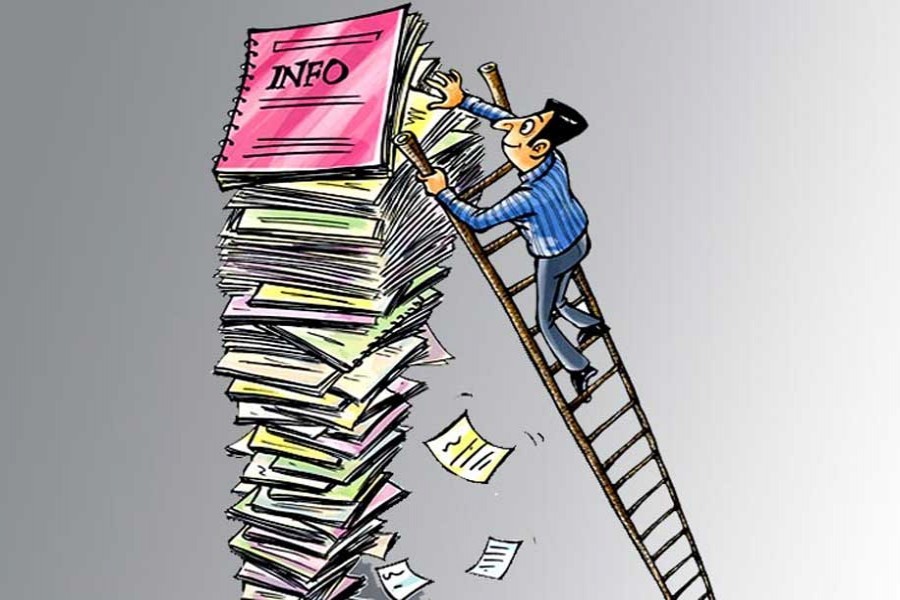Most government agencies’ websites look barren as the agencies seem reluctant to regularly update their contents for public consumption, according to a survey of 30 such sites.
However, they are bound to publish and update information in line with the Right to Information Act (RTI)-2009.
Thus, people are being deprived of their rights and disrupting the government’s transparency and accountability.
According to the latest UN biannual report styled 'E-Government Survey 2020: Digital Government in the Decade of Action for Sustainable Development', the country slipped four notches down to 119th in terms of provision of online services, telecoms connectivity and human capacity.
People hardly get benefits from the RTI as some 75 per cent of them do not know about the law, according to Transparency International Bangladesh (TIB).
A 2019 survey, commissioned by the DFID and World Bank, stated that only 7.7 per cent of the 12,800 people surveyed are aware of the law.
This FE correspondent found that even the Information Commission’s website published its annual report up to 2019.
Not only that, the information and broadcasting ministry also updated its annual report of the fiscal year (FY) 18-19.
The same is the state of the environmental department that updated its annual report of FY 17-18 in a gross violation of the RTI act.
The scenario of other government agencies’ websites is also as dismal as the mentioned ones.
Talking to The Financial Express, Dr Iftekharuzzaman, Executive Director of TIB, said Bangladesh has a commendable RTI Law which has the potential to greatly contribute to good governance and corruption control in the country.
However, 12 years after the law has been enacted, despite some visible efforts and progress at both government and non-government levels, there is a long way to go in effectively implementing the law, he pointed out.
Implementation of people’s right to information needs transformation from an age-old culture of secrecy in the corridors of the government to a culture of openness, which needs political commitment as well as multi-stakeholders collaborative interventions involving the government, NGOs, media and Information Commission with a strategic vision, Dr Zaman said.
Chief Information Commissioner Martuza Ahmed in the annual report 2019 said every authority should be very attentive in protecting and managing their data and circulate and publicise them in line with related notifications, rules and laws.
Citing sub-section 3 under section 6 of the Right to Information Act (RTI), 2009, he also said there is a plain obligation to release the annual report containing the yearly functions and activities of every government institution and their attached organisations.
Repeated phone calls were made to the chief information commissioner and two others commissioners to talk to them directly on the occasion of International Day for Universal Access to Information.
However, they did not receive this correspondent’s phone calls.
Section 6(3) of the RTI stated that every authority shall publish a report every year which shall contain the following information, namely: particulars of its organisational structure, activities, the responsibility of the officers and employees, or description and process of decision making.
This correspondent went through at least 30 websites of the government’s different important agencies and found their annual reports not fully updated.
Access to Information (a2i) programme has created all government websites. The number of government websites is nearly 33,500 and the number of attached offices is 51,512.
Mohammad Arfe Elahi, chief technology officer of (a2i), told The Financial Express that the responsibility of updating websites belongs to concerned agencies.
Access to Information (a2i) also provided training to the concerned officers who maintain the websites, he pointed out.
However, we monitor whether the concerned organisations update their data or not, if they delay in updating, we request them to update, he said.
Sometimes a2i requests the cabinet division to update the information of those websites which delaying data update, Elahi added.
Dr Zaman also insisted that the international right to know day is a good opportunity for all stakeholders of the law to look at the mirror and ask themselves if they have done enough to enforce the law at their respective levels. This may help strategise for the next twelve years in a manner that will generate true benefits of the law for the people of the country.
“I don’t think the spirit and objective of the day is limited to one day in a year only. We should be able to convert every day of the year as a day of people’s right to access to information”, Dr Iftekharuzzaman said.
Alongside the government, other stakeholders like non-government organisations, media and the Information Commission must be proactive in both campaigning for the implementation of the law as well as practising it, the TIB executive director said.
It is important that those who preach also practice. Lack of proactive initiatives to practice, as a recent study by TIB has reported, remains the key predicament, he mentioned.
The study has shown that while government institutions have done reasonably well in proactive disclosure though they still have a long way to go, the state of performance of the sampled NGOs in practising proactive disclosure as per relevant provisions is dismally low, he stated.
“We hope that as the key forces behind the enactment of the law and now its implementation, NGOs will be able to show a greater sense of seriousness and responsibility with regard to practice of what they preach”, he added.
Md. Saifullah, Senior Deputy Principal Information Officer of Press Information Department said under the law, 119,831 individuals were served with the information as per their demand across the country from July, 2009 to December, 2020.


